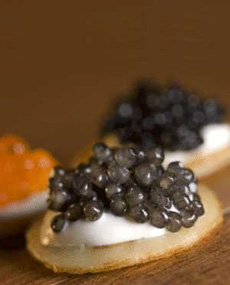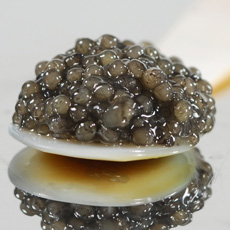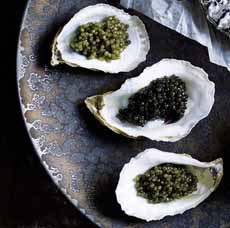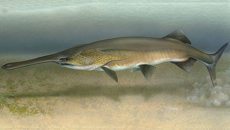Caviar Glossary: A Glossary Of The Different Caviar TypesPage 7: Caviar Glossary P To Q This is Page 7 of an 10-page article. Click on the red links below to visit other pages. This glossary is protected by copyright and cannot be reproduced in whole or part. You are welcome to link to it.
|
 Paddlefish caviar can be recognized from its pale grey pearls, often with a brownish hue. Photo courtesy CaviarCaviar.com. |
|
| PACIFIC STURGEON See white sturgeon.
|
||
| PADDLEFISH STURGEON OR SPOONBILL CAVIAR Providing what some consider to be the best substitute for the more expensive sturgeon caviars, the North American Paddlefish (Polyodon spathula) is a close relative of the sturgeon. It lives more than 50 years, grows to five feet in length and weighs 60 to 100 pounds. Its long, thin nose protrudes some 15 inches, like a swordfish’s. The caviar flavor is rich and complex; some people find it comparable to sevruga caviar in taste: the texture is smooth and silky; it is slightly saltier and more understated than Caspian sturgeon caviar. The smallish eggs come in many shades of gray from pale to dark steel, and are also found in golden brown tones. Paddlefish caviar can taste “muddy”; as with any product, some are better than others. Paddlefish are one of the largest freshwater fish in North America. Primarily harvested for its caviar, the meat is also delicious fresh or Two major producers are Osage Catfisheries, in Osage Beach, MO, which markets its product under the L’Osage brand, and Shuckman’s Fish Co. & Smokery Louisville Kentucky, which markets Kentucky Spoonfish Caviar. Paddlefish meat has a texture similar to swordfish and is sold smoked or in steaks. Although not popular in the West, it is considered a delicacy in Asia. Some caviar reviewers have found the paddlefish caviar from the indoor farm in Germany (as well was from some domestic-farmed paddlefish to be “off-flavor,” with a muddy, pondy or briny taste (green-cast eggs are a giveaway). This should change over the next 10 years as farm technologies improve. Today, look for wild-caught, sustainable paddlefish caviar that is light gray to dark gray in color, with no green hue. |
 Paddlefish caviar. Photo courtesy BackyardGardener.com.
|
|
| PASTEURIZED CAVIAR Caviar is sterilized at high temperatures to remove harmful microorganisms so that it has a longer shelf life (it may or may not require refrigeration, depending on the particular product). Pasteurization semi-cooks the caviar and makes it slightly saltier. It also changes the mouth feel, making it slightly harder, although the quality and price remain the same. Regular caviar should be stored at 28°F to 32°F; unopened jars can be stored for four weeks. Pasteurized caviar will keep in the refrigerator unopened for several months. Once opened, all caviars should be consumed within two to three days.
|
||
| PEARLS The caviar eggs are also called pearls or beads in the trade.
|
||
| PERSIAN CAVIAR Caviar from Iran, the present-day name for Persia.
|
||
| PERSIAN STURGEON The Persian sturgeon (Acipenser persicus), formerly plentiful in the Caspian Sea and Black Sea, has been overfished to Endangered Species status. Much of the caviar consumed and exported by Iran is Acipenser persicus.
|
 You can see why caviar eggs are called pearls and beads in the trade. Photo courtesy Petrossian. |
|
| PIKE ROE Small-grained pike roe is pale gold in color with a mild, delicate taste. It is best used for hors d’oeuvres, garnishes, or on blini or toast points with crème fraîche, as shown in the photo at right.
|
||
| POOR MAN’S CAVIAR Another term for eggplant caviar, a dip or spread made with eggplant, tomatoes, onions, green and red bell peppers and parsley. It contains no caviar.
|
 Pike roe is available at Petrossian.com. |
|
| PRESSED CAVIAR or PAYUSNAYA Also called payusnaya or pajusnaya. The eggs that are broken in the sieving process, or are otherwise weak or damaged, are made into pressed caviar. While pressed caviar is made from the ripest beluga, osetra and sevruga eggs, the product is completely different from fresh caviar; it is much oilier, saltier and more pungent. The eggs are cleaned, combined, packed in linen bags and hung to drain. As salt and moisture drain away, the eggs are pressed into pressed into a paste that is available in block or spread form. The spread version is popular on toast or with hot potatoes; the blocks can be sliced like truffles and served over pasta—or in cubes, on toothpicks. Approximately three pounds of roe produce one pound of pressed caviar. Continue To Next Page: Caviar Terms With R
|
|
|
© Copyright 2005-2026 Lifestyle Direct, Inc. All rights reserved. All images are copyrighted to their respective owners.



